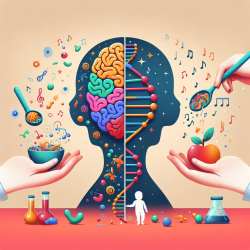Introduction
As practitioners dedicated to enhancing children's outcomes, understanding the intricate relationship between early life nutrition and mental health is crucial. Recent research, such as the study "Early Life Nutrition and Mental Health: The Role of DNA Methylation," provides compelling evidence on how nutrition impacts mental health through epigenetic mechanisms. This blog explores the key findings of this research and how practitioners can apply these insights to improve therapeutic interventions.
The Role of Nutrition in Epigenetic Modifications
The study highlights the significant role of one-carbon metabolism-associated micronutrients—such as choline, betaine, folate, methionine, and B vitamins—in brain function and mental health. These micronutrients are crucial in forming S-Adenosylmethionine (SAM), a major methyl donor for DNA and histone methylation, which are essential processes in gene expression regulation.
Epigenetic mechanisms, including DNA methylation, are influenced by these dietary components, potentially altering gene expression and impacting mental health across the lifespan. The research underscores the importance of optimizing early-life nutrition to promote better mental health outcomes.
Implications for Practitioners
Practitioners can leverage these findings to enhance therapeutic strategies for children. Here are some practical steps:
- Individualized Dietary Recommendations: Consider the role of micronutrients in dietary plans, especially during critical developmental periods. Tailoring nutrition to support optimal mental health can be a proactive approach.
- Parental Education: Educate parents on the importance of nutrition during pregnancy and early childhood. Encourage diets rich in methyl donors to support healthy brain development.
- Collaborative Care: Work with nutritionists and other healthcare providers to create comprehensive care plans that address both nutritional and therapeutic needs.
Encouraging Further Research
While the study provides valuable insights, it also highlights the need for further research to establish causal relationships and refine dietary recommendations. Practitioners are encouraged to stay informed about ongoing research and contribute to the growing body of knowledge in this field.
Conclusion
Understanding the link between early life nutrition and mental health through epigenetic mechanisms opens new avenues for improving therapeutic outcomes. By integrating these insights into practice, practitioners can play a pivotal role in shaping healthier futures for children.
To read the original research paper, please follow this link: Early Life Nutrition and Mental Health: The Role of DNA Methylation.










